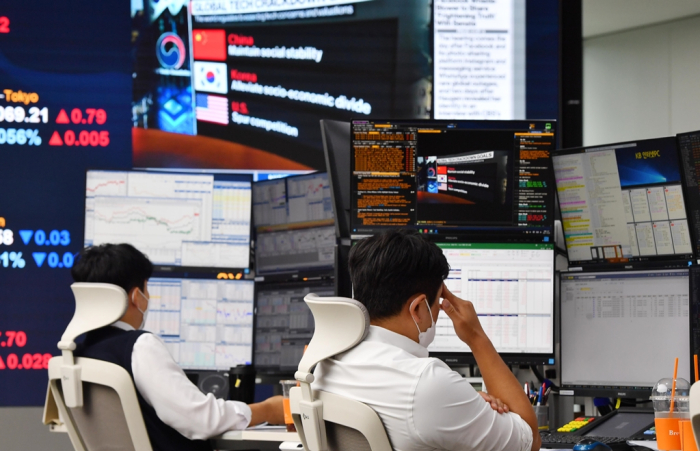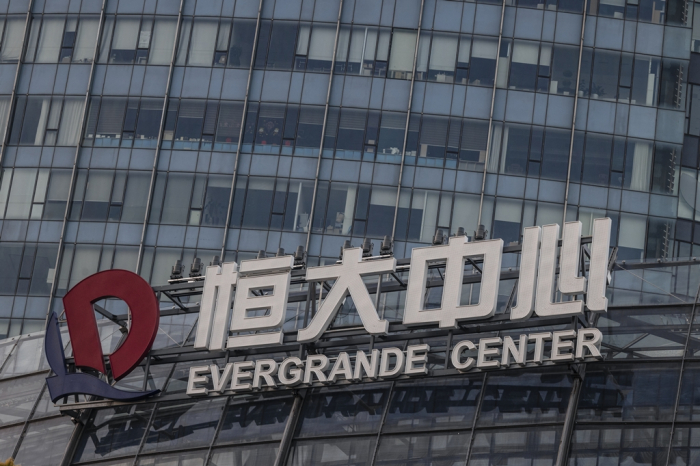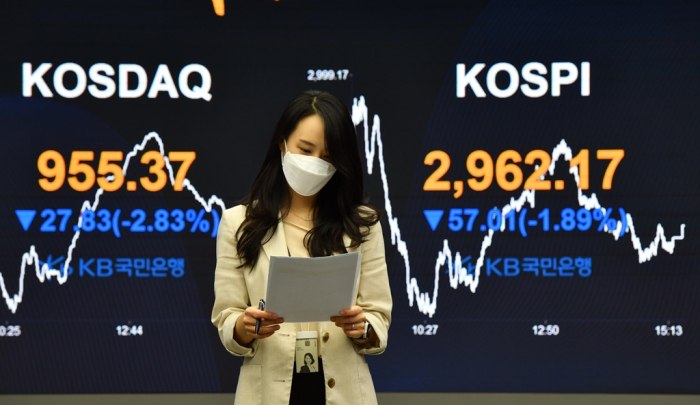Markets
Kospi lowest in nearly 7 months; outlook dim on inflation, US debt standoff
The equities market will remain subdued with little momentum to head higher until year-end, analysts say
By Oct 05, 2021 (Gmt+09:00)
4
Min read
Most Read

South Korea's main stock index has fallen below the psychologically important 3,000 points for the first time in nearly seven months, with investors spooked by growing fears of inflation and the uncertainty surrounding the debt crisis in China and the standoff over US government spending.
Analysts say Korean shares will remain subdued for the time being, with the benchmark Kospi index trapped in a boxed range amid little momentum to head higher at least until the end of the year.
The Kospi finished 1.9% lower at 2,962.17 on Tuesday, the lowest since March 10.
The main index fell to an intraday low of 2,940.59 earlier in the day, dashing hopes for a rebound following the long weekend.
Korean stocks got off to a weak start, taking the firmly negative cues from Wall Street overnight.
US stocks declined on Monday, led by a heavy selloff in technology shares on the threat of persistently high inflation. The S&P 500 fell 1.3%, dipping below its 100-day moving average, while the Nasdaq shed 2.2% and the Dow Jones Industrial Average slid 0.9%.
In Seoul, foreign investors sold 620 billion won ($522 million) worth of shares on Tuesday, while retail investors and institutions sold shares worth 350 billion won and 240 billion won, respectively.

US DEBT STANDOFF, CHINA CRISIS
The heavy selling pressure came as investor sentiment turned sour on concerns about an impasse in the US debt ceiling debate, which could deal a blow to the Biden administrationŌĆÖs heavy spending plans.
Repercussions from the debt crisis involving Chinese real estate developer Evergrande Group and the failure to repay a debt by another Chinese property firm Fantasia Holdings Group Co. have also weighed on investors, increasing volatilities in the Korean market, traders said.
Energy prices also remained high, fanning the already high inflation risks. In the US, West Texas Intermediate (WTI) crude oil futures for November gained 2.2% to $77.62 a barrel, the highest settlement since November 2014.
The 10-year US Treasury yield jumped to 1.481%, driven by growing inflation worries.
ŌĆ£The critical level of the US Treasury yield will be 1.5%. If it goes above that, high growth stocks such as tech could crumble,ŌĆØ said HI Investment & Securities analyst Cho Ik-jae.
Among the heavyweights, tech giant Samsung Electronics Co. fell 1.4% to 72,200 won and peer SK Hynix Inc. shed 2.1% to close at 97,900 won.
Bio and platform stocks also plummeted.
While Samsung Biologics Co. dropped 7.2% to 812,000 won, Celltrion Inc. declined 12.1% to 218,000 won. Internet-only bank KakaoBank Corp. fell 8.4% at 60,000 won.
ŌĆ£The chip industry could face a down cycle from the fourth quarter. Game companies are also forecast to post weak earnings due to tighter regulations,ŌĆØ said Lee Kyoung-min, an analyst at Daishin Securities.

TRAVEL, ENTERTAINMENT BUCK THE TREND
Meanwhile, travel and entertainment shares rose on expectations that the Korean government will soon implement the ŌĆ£With CoronaŌĆØ policy in a shift of quarantine rules to let people with mild COVID symptoms live a normal life without isolation.
Lotte Tour Development Co. rose 5.9% to 21,650 won, and CJ CGV, KoreaŌĆÖs leading multiplex cinema chain, gained 3.4% to 32,200 won.
Analysts say the latest decline in the equities market is different from that in March, when the Kospi also broke below the 3,000 points.
ŌĆ£Concerns over the US tapering were relatively low at the time. Encouraging economic indicators also fanned expectations for an early recovery. However, along with a growing list of worries, investors now have to brace for the Federal Reserve to begin tapering stimulus as early as next month,ŌĆØ said a local brokerage analyst.
In SeoulŌĆÖs bond market, the three-year Treasury yield added 1.7 basis points to 1.65%, while the five-year government note rose 2.8 basis points to 1.99%.
SURVEY ON ASSET MANAGERS
According to a survey by The Korea Economic Daily of 112 asset managers, about 60% of the respondents said they expect the Kospi to reach the yearly bottom by November.
Some 41% expect the main index to move in a range of 2,900-2,999 points over the next couple of months, while 8.9% forecast a lower range of 2,700-2,799 points.
The biggest potential risks in the Korean equities market in the fourth quarter will be the start of the US tapering (slowdown of central bank asset purchases) to absorb market liquidity and higher US bond yields, the survey showed.
Write to Jae-Yeon Ko, Sung-Mi Shim and Eui-Myung Park at yeon@hankyung.com
In-Soo Nam edited this article.
More to Read
-
 MarketsKorea stocks, won tumble as foreigners dump $1 bn in equity futures
MarketsKorea stocks, won tumble as foreigners dump $1 bn in equity futuresSep 28, 2021 (Gmt+09:00)
2 Min read -
 Stock marketS.Korean millennials rush on Nasdaq and NYSE amid sluggish Kospi
Stock marketS.Korean millennials rush on Nasdaq and NYSE amid sluggish KospiAug 27, 2021 (Gmt+09:00)
3 Min read
Comment 0
LOG IN




